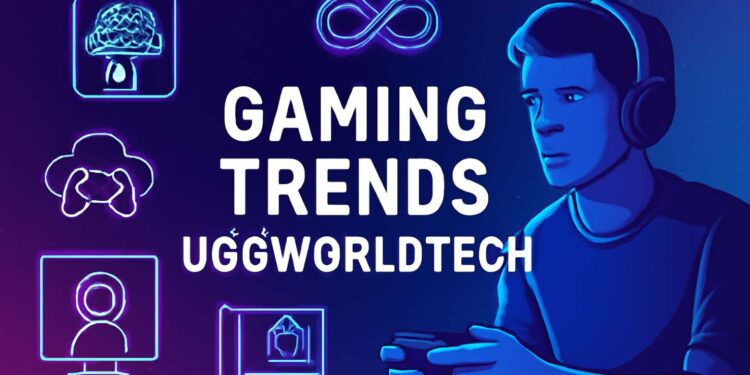If you’ve been keeping an eye on the gaming industry, you’ve probably noticed how fast things are shifting. From artificial intelligence shaping entire worlds to cloud gaming putting console-level titles on your phone, the pace is incredible. One term you may have come across in conversations is gaming trends UGGworldtech, a catch-all way of describing how platforms like UndergrowthGames are driving this wave of transformation. Whether you’re a player, developer, or industry observer, understanding these trends helps you see where gaming is headed next.
What Is UGGworldtech and Why Does It Matter in Gaming?
UGGworldtech represents a forward-looking space where emerging technologies and creative game design meet. It’s tied closely to UndergrowthGames, a studio and platform that experiments with innovation, from AI-driven development tools to immersive storytelling techniques.
Why does it matter? Because it’s not just about new games. It’s about reshaping how players experience gaming, how developers build worlds, and how the business side of gaming adapts to new realities. This blend of technology, market dynamics, and design is why the phrase gaming trends UGGworldtech keeps surfacing in discussions about the future of play.
How Are Artificial Intelligence (AI) Tools Changing Gaming?

Artificial intelligence is no longer just about clever enemy bots. Developers are using AI to generate textures, environments, and even entire quests at scale. Generative AI cuts down on the long production cycles that used to define game creation, allowing studios to experiment and iterate faster.
For players, AI shows up in more personalized experiences. NPCs can now learn from your choices, adapt to your strategies, and feel far more lifelike than the scripted characters of old. Difficulty levels can even adjust dynamically, keeping you engaged without feeling frustrated. AI isn’t just making games smarter—it’s making them more human in the way they respond to us.
What Role Does Cloud Gaming Play in the Future of UGGworldtech?
Cloud gaming has moved from being a novelty to a core part of the industry. By streaming games from powerful servers, it gives players access to high-end titles on everyday devices. Imagine running a console-quality RPG on your tablet without needing to download 80GB of data.
While cloud gaming won’t completely replace native platforms anytime soon, it’s driving hybrid experiences. These are games that feel console-polished but still offer mobile-friendly features, appealing to players who want flexibility without sacrificing quality.
How Is Extended Reality (XR) Transforming Gameplay?
Extended reality combines augmented, virtual, and mixed reality into one immersive approach. VR headsets are still pushing the boundaries of full immersion, but AR is quickly becoming mainstream. Titles that layer digital content onto the real world are blurring the line between life and play.
Mixed reality goes even further, letting players interact with both real and digital environments simultaneously. For developers working within the UGGworldtech ecosystem, XR is a proving ground for creativity—where games don’t just tell stories but surround you in them.
Why Are New PC Storefronts Challenging Steam?
For years, Steam has been the dominant digital marketplace. But new storefronts are stepping up, offering fresh opportunities for developers and players. Platforms are experimenting with better revenue splits, curated libraries, and even direct-to-consumer models.
This shift is significant because it decentralizes power. Developers no longer have to rely on a single gatekeeper, and players benefit from more competition, innovation, and pricing options.
What Are “Forever Games” and Why Are They Taking Over?
The idea of releasing one title, letting it run its course, and moving on is fading. Today’s studios are focusing on “forever games”—live-service titles designed to keep players engaged for years. Fortnite, Apex Legends, and Destiny 2 are just a few well-known examples.
These games thrive on updates, seasonal events, and community engagement. For developers, they provide steady revenue streams. For players, they create ongoing experiences that feel alive and ever-changing. The only drawback? It can feel overwhelming to keep up, especially when your game of choice becomes a second job.
Which Monetization Models Are Dominating Gaming Right Now?
The business side of gaming has become as innovative as the games themselves. Developers are experimenting with hybrid monetization models that combine direct purchases, subscriptions, and in-game rewards.
Web shops are gaining traction, giving studios the ability to sell directly to their communities and bypass hefty platform fees. Battle passes remain a favorite, offering tiered rewards for consistent play, while subscription services like Xbox Game Pass are reshaping how players access entire libraries.
The challenge is balance: how do you maximize revenue without alienating your audience? The companies that succeed will be those that respect the player experience while innovating in business models.
How Are Antitrust Regulations Affecting Gaming Platforms?
The legal landscape is shifting too. Regulations like the EU’s Digital Markets Act are forcing tech giants to loosen their grip. Apple and Google, once notorious for strict control over app payments, are now opening doors for alternative payment methods and storefronts.
This may sound like dry policy talk, but its impact is massive. For developers, it means more freedom. For players, it means potentially lower prices, more choices, and fairer ecosystems. It’s a subtle but important trend shaping the future.
What Are Hybrid-Casual Games and Why Are They Popular?

Hybrid-casual games blend the easy accessibility of casual titles with the deeper mechanics of mid-core experiences. Think of a simple puzzle game that also includes RPG-style upgrades or multiplayer competition.
These games are booming partly because of changes in mobile advertising rules. Developers needed new ways to attract and retain users, and hybrid-casual became the solution. They’re sticky, fun, and flexible—making them a favorite trend in the mobile space.
How Is Gameplay Design Evolving in 2025?
Genres aren’t as rigid as they used to be. Developers are mixing styles to create fresh experiences—RPG shooters, puzzle-strategy hybrids, and more. This genre-bending approach keeps games exciting and appeals to broader audiences.
Social features are also more prominent. Built-in chat, co-op play, and streaming integration are no longer optional—they’re expected. Players want to connect, compete, and share.
Meanwhile, remakes and reboots keep nostalgia alive, while early-access models let fans shape development from day one. Together, these design choices show just how player-driven the industry has become.
What Extra Gaming Trends Should You Watch in UGGworldtech?
Beyond the big three areas—technology, business, and design—several emerging shifts are worth noting.
- eSports continues to grow, with bigger audiences and more mainstream recognition.
- Blockchain and Web3 games are experimenting with ownership models, though still controversial.
- Cross-platform play is becoming standard, ensuring friends can connect regardless of device.
- Accessibility and inclusivity are taking center stage, with developers designing for wider player communities.
These aren’t just buzzwords. They’re signals of how the culture of gaming is expanding to welcome more people, more devices, and more ways to play.
Also Read : teids login
FAQs About Gaming Trends UGGworldtech
What makes UGGworldtech different from other gaming trend platforms?
UGGworldtech focuses on integrating new technologies and player-centric design, bridging the gap between developers and gamers. It’s not just about what’s popular—it’s about what’s possible.
Is AI in gaming good for players or just for developers?
Both benefit. Developers save time and expand creativity, while players enjoy more adaptive, lifelike, and personalized experiences.
Will cloud gaming replace consoles and PCs?
Not entirely. Cloud gaming offers flexibility and access, but consoles and PCs still provide stability and performance. Instead, hybrid models will dominate.
What are examples of popular “forever games”?
Titles like Fortnite, Apex Legends, and Genshin Impact are classic examples, offering ongoing updates and community-driven experiences.
Are hybrid-casual games just another mobile fad?
Not likely. Their balance of easy fun and deeper engagement has made them highly sustainable compared to one-note casual titles.
How do antitrust regulations benefit everyday gamers?
They reduce monopolistic control, increase competition, and can ultimately lower costs while improving choice.
Why are remakes and reboots so common in gaming now?
Nostalgia plays a role, but so does technology. Studios can reintroduce beloved classics to new audiences with modern polish.
What future trends could reshape UGGworldtech in the next five years?
Expect greater emphasis on cross-platform ecosystems, expanded use of XR, and deeper integration of AI into both development and gameplay.
Final Thoughts: Where Gaming Is Headed
The phrase gaming trends UGGworldtech captures more than just a list of innovations. It signals a movement toward games that are smarter, more immersive, and built around long-term player engagement. With AI, cloud platforms, XR, new business models, and shifting regulations, the landscape is evolving rapidly.
For gamers, that means more ways to play, connect, and create. For developers, it means more tools and opportunities. And for the industry, it means a future that looks less like a single platform and more like a global ecosystem where creativity has no boundaries.










